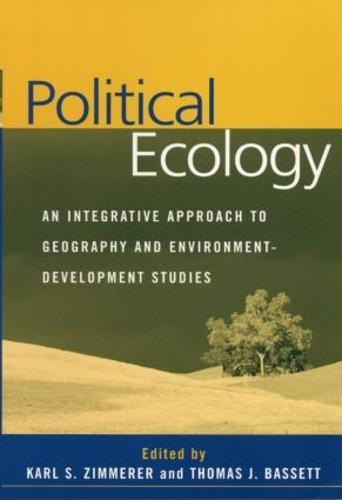Overview
This volume offers a unique, integrative perspective on the political and ecological processes shaping landscapes and resource use across the global North and South. Twelve carefully selected case studies demonstrate how contemporary geographical theories and methods can contribute to understanding key environment-and-development issues and working toward effective policies. Topics addressed include water and biodiversity resources, urban and national resource planning, scientific concepts of resource management, and ideas of nature and conservation in the context of globalization. Giving particular attention to evolving conceptions of nature-society interaction and geographical scale, an introduction and conclusion by the editors provide a clear analytical focus for the volume and summarize important developments and debates in the field.
Full Product Details
Author: Karl S. Zimmerer ,
Thomas J. Bassett ,
Emily Young ,
Juanita Sundberg
Publisher: Guilford Publications
Imprint: Guilford Publications
Dimensions:
Width: 15.20cm
, Height: 1.90cm
, Length: 22.90cm
Weight: 0.440kg
ISBN: 9781572309166
ISBN 10: 1572309164
Pages: 310
Publication Date: 20 November 2003
Audience:
College/higher education
,
Professional and scholarly
,
Tertiary & Higher Education
,
Professional & Vocational
Format: Paperback
Publisher's Status: Out of Print
Availability: In Print

Limited stock is available. It will be ordered for you and shipped pending supplier's limited stock.
Reviews
The editors...use their introduction and conclusion to suggest that these articles lay out a domain of work constituting a particularly geographical contribution to political ecology. That is what sets this political ecology text apart from others that have been published recently and what makes it particularly helpful, especially for teaching geography. Its exploration of connections between political ecology and more general concerns within the discipline...offers a suggested way for thinking through the relationships between geography and this more interdisciplinary subfield....In that set of required texts listed at the top of the first page of future syllabi for political ecology courses, this one will occupy an important slot for a good many years. -- The Geographical Review <br> This is a worthwhile text for readers at any level, as much for the outstanding substantive chapters as for the front and back matter....this book is particularly appropriate for advanced undergraduate reading courses or introductory graduate courses on human-environment relationships. The chapters' adherence to multiscalar (both temporal and spatial) analysis empowers those interested in studying environmental issues to break away from monolithic theoretical constructs. -- Annals of the Association of American Geographers <p> This volume's most valuable contribution is its methodological breadth. -- Regional Studies <br>
An illuminating and comprehensive volume of case studies in political ecology, edited by two of the field's most distinguished analysts. Addressing issues of politics, landscape, and representation, chapters examine topics ranging from urban waterscapes to mountain agriculture, from GIS and environmental science to ecotourism and slavery. The book provides a tour d'horizon of political ecology through its foundational discipline, geography. Useful for students, scholars, and practitioners, this will be an indispensable text for all readers interested in the biophysical and social forces that shape land use. --Susanna Hecht, PhD, Department of Urban Planning, UCLA School of Public Policy and Social Research<br><br> Zimmerer and Bassett have assembled an important set of classic and newer essays that emphasize the full integration of ecological process into political ecology. All the chapters take seriously the analysis of nature's agency in political ecology, enabling the authors to collectively 'push the envelope' of work in this dynamic field. While authors are primarily geographers, the volume also incorporates sociological and anthropological perspectives. The editors' introduction and conclusion demonstrate the wide relevance of political ecology to environmental understandings and change, while transcending traditional environmental management and sustainable development paradigms. Addressing interwoven themes of scale, history, ecology, epistemology, and access, this provocative book will be useful in classroom and research settings. It is sure to become an important, classic text for political ecologists of all stripes. --Nancy Lee Peluso, Department of Environmental Science, Policy, and 6Management, University of California, Berkeley<br>
An illuminating and comprehensive volume of case studies in political ecology, edited by two of the field's most distinguished analysts. Addressing issues of politics, landscape, and representation, chapters examine topics ranging from urban waterscapes to mountain agriculture, from GIS and environmental science to ecotourism and slavery. The book provides a tour d'horizon of political ecology through its foundational discipline, geography. Useful for students, scholars, and practitioners, this will be an indispensable text for all readers interested in the biophysical and social forces that shape land use. --Susanna Hecht, PhD, Department of Urban Planning, UCLA School of Public Policy and Social Research Zimmerer and Bassett have assembled an important set of classic and newer essays that emphasize the full integration of ecological process into political ecology. All the chapters take seriously the analysis of nature's agency in political ecology, enabling the authors to collectively 'push the envelope' of work in this dynamic field. While authors are primarily geographers, the volume also incorporates sociological and anthropological perspectives. The editors' introduction and conclusion demonstrate the wide relevance of political ecology to environmental understandings and change, while transcending traditional environmental management and sustainable development paradigms. Addressing interwoven themes of scale, history, ecology, epistemology, and access, this provocative book will be useful in classroom and research settings. It is sure to become an important, classic text for political ecologists of all stripes. --Nancy Lee Peluso, Department of Environmental Science, Policy, and 6Management, University of California, Berkeley




